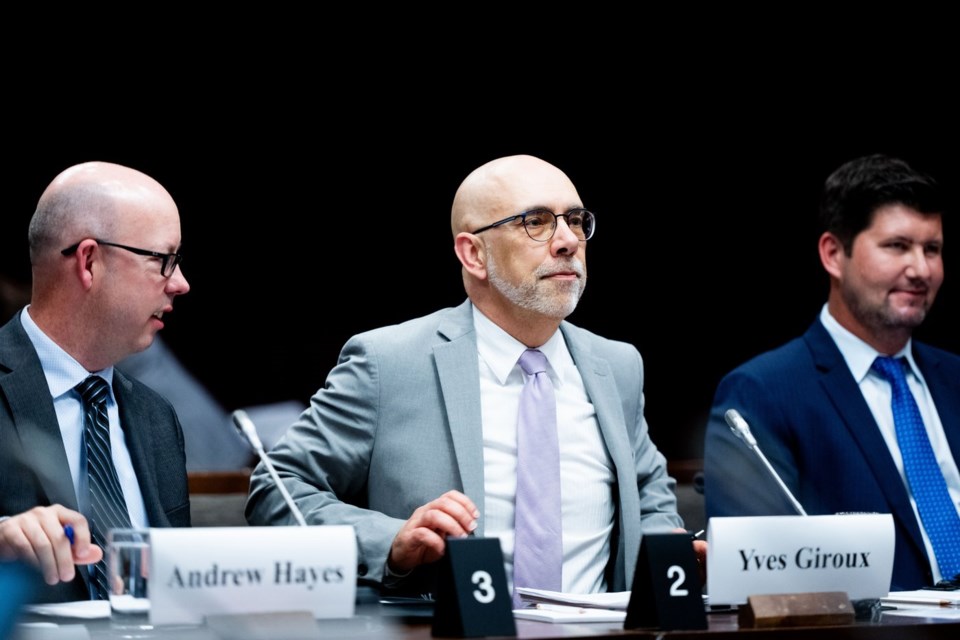OTTAWA — Parliamentary budget officer Yves Giroux told a House of Commons committee Monday that the federal Liberals are not muzzling him over economic data related to the impact of carbon pricing.
Giroux was correcting the record after he says he left the wrong impression at a committee meeting two weeks ago.
The Conservatives have pounced on the claim, made on June 3, to accuse the Liberal government of interfering with the work of an independent officer of Parliament.
Giroux said Monday that is not the case.
"The government is not muzzling me,' he said at a meeting of the Government Operations Committee, where he was appearing on an unrelated matter.
Giroux said there was confusion when he answered a question in English, which is not his first language.
The issue arose as Giroux was asked about his carbon pricing analysis at the House of Commons finance committee, and to explain his admission earlier this spring that his original analyses were flawed.
Both his 2022 and 2023 analyses concluded that while most Canadian families get more from carbon rebates than they pay in carbon pricing, those benefits are mostly erased when you factor in economic impacts on jobs and wages.
The findings have become a major part of the carbon pricing debate as the Liberals insist the rebates offset the cost for most people, while the Conservatives maintain they don't.
The analysis was only supposed to measure the economic impact of the consumer carbon levy but it included the big industrial carbon price as well. The rebates which Giroux was measuring are based only on the consumer levy.
He is redoing the numbers but has said he doesn't think the results will be different.
In a tense exchange about that claim with Liberal Parliamentary Secretary for Finance Ryan Turnbull at the June 3 meeting, Giroux insisted the government had data that proves the point, because he has seen it.
But he said they won't release the data.
Not long after Conservative MP Marty Morantz asked him if the government was preventing him from releasing it.
"They put a gag on you basically saying you can’t talk about it," Morantz asked.
"That is my understanding," Giroux replied.
The Conservatives attacked the Liberals over and over following that exchange. Multiple Conservative MPs asked about or raised the issue of a "gag order" against Giroux, bringing it up at least 40 times in the House between June 4 and June 14.
Under questioning from Liberal MP Charles Sousa Monday, Giroux said the claim had been a misunderstanding. This time he answered in French, his more comfortable language.
"The government has not muzzled me in the publication of a report or in the content of any of the reports that I published," he said.
He says he was told not to disclose the actual data Environment and Climate Change Canada gave him to prepare his analysis.
The documents include a number of spreadsheets on GDP and emissions data based on economic and climate models of the impact of carbon pricing.
The government had previously refused to make the data public, saying it was only telling part of the story without factoring in the positive economic impacts of climate investments and the carbon rebates or the negative economic impacts of climate change itself.
The Canadian Climate Institute reported in 2022 that by 2025 climate change will already have lowered Canada's GDP by $25 billion a year.
However, the spreadsheets were released last Thursday just as the Conservatives tabled a motion demanding their release.
The data showed that with carbon pricing, Canada's emissions will be 12 per cent lower in 2030 than without it, a difference that amounts to about 78 million tonnes of greenhouse gas emissions.
On the economic side, carbon pricing will reduce the national GDP by 0.9 per cent or $25 billion.
Environment Minister Steven Guilbeault said Tuesday he was glad that Giroux had corrected the record.
The Conservatives say the Liberals refused to release the data because it confirms that carbon pricing has a negative economic impact.
Conservative Leader Pierre Poilievre also insisted last week that the $25 billion figure was not accurate because it did not account for inflation. He said with that it was actually $30 billion.
Conservative House Leader Andrew Scheer asked Giroux about that Tuesday in committee.
However, Chris Matier, the director general of economic and fiscal analysis at the parliamentary budget office, told Scheer the $25 billion figure does account for inflation.
Scheer also asked Giroux to confirm if the carbon price will reduce the economic impact of climate change. Giroux said not on its own because climate change is a global phenomenon.
This report by The Canadian Press was first published June 18, 2024.
Mia Rabson, The Canadian Press




